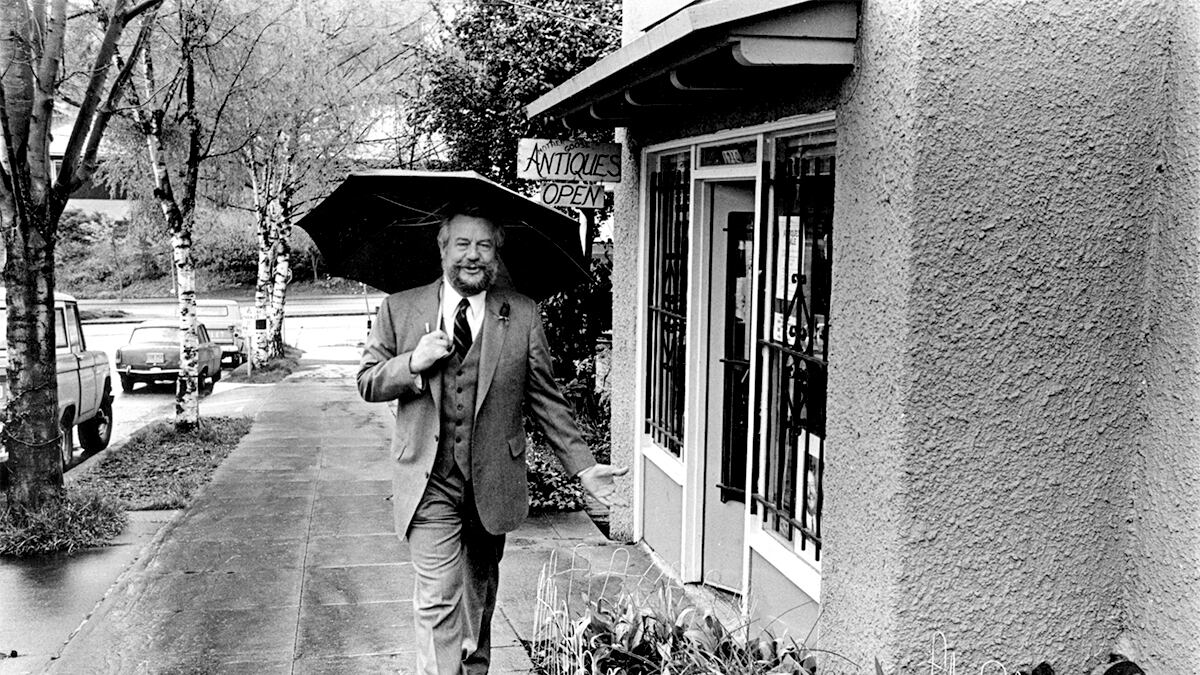BUD CLARK R.I.P. (1931-2022): Former Portland Mayor John Elwood “Bud” Clark Jr., a publican turned politician who personified this city’s iconoclastic streak, died Feb. 1 at age 90. Clark and his wife, Sigrid, opened the Goose Hollow Inn in Southwest Portland in 1967. Known for his handlebar mustache and a 1978 poster in which Clark opened his trench coat to “expose himself to art,” Clark ran a longshot campaign for mayor in 1984. He shocked the city and incumbent Frank Ivancie, the last bastion of the city’s conservative past, winning outright in the May primary. Clark, a first-time candidate, creditably served two terms, leading the development of the Oregon Convention Center and implementing community policing. When his tenure ended, he returned to Goose Hollow Inn, which his family still owns and operates. He was an enthusiastic cyclist, raconteur and, above all, a staunch supporter of Portland who enlivened conversations with his verbal signature, “Whoop, whoop!”
LIBERAL PORTLAND COPS WANT MORE TRAINING THAN CONSERVATIVES: City Hall released a long-awaited report Jan. 31 compiled by the OIR Group, which signed a $150,000 contract with the city to review possible political and racial bias within the Portland Police Bureau. Among the most interesting findings in the 80-page report are those that pertain to political affiliation. Of the 276 PPB officers who responded, 33% identified as “very” or “somewhat conservative,” and 26% identified as “very” or “somewhat liberal.” (The remainder did not identify as either or declined to state their political viewpoint.) The contractor also asked officers whether they thought the bureau needed more training to “prevent racial views from unfairly influencing officers’ work.” The contractor found a gender gap. “Men were more likely than women to believe there is no need for additional racial bias training,” the report says. “Liberals leaned more toward the need for more racial bias training.” Finally, the contractor found that 15% of respondents planned to leave the bureau in the next year—an attrition rate three times the 2020-21 national average of 4.9%.
CRYPTOCURRENCY INVESTOR HIT WITH ELECTIONS COMPLAINT: The first sign of friction in the crowded race for Oregon’s new 6th Congressional District has emerged: Portland lawyer Joel Corcoran filed a complaint with the Federal Elections Commission alleging Cody Reynolds, the cryptocurrency investor who put $2 million into his own campaign, had failed to include required disclosures in campaign ads he’s running on television and online. Reynolds, who previously ran four other times for federal office without the kind of bankroll he now has, says he had not seen the complaint until WW sent it to him, but believes he has followed the law. “We’re checking our videos and believe we’re in compliance,” Reynolds says. Corcoran did not respond to a request for comment.
ENVIROS SIGN ON TO ELLIOTT STATE FOREST DEAL: Environmental groups are backing an agreement that would keep the Elliott State Forest public, including creating a 34,000-acre reserve, protecting and expanding old-growth forest, and reimbursing the state’s common school fund $121 million. The forest was nearly sold in 2017, when Oregon State Treasurer Tobias Read, a Democrat, voted with then-Secretary of State Dennis Richardson, a Republican, to sell the land, which is rich in timber and held by the state to fund schools. Read reversed himself after pressure from environmental groups—and now he, Gov. Kate Brown and Secretary of State Shemia Fagan are backing Senate Bill 1546, which would turn the Elliott into a research forest managed by Oregon State University. In three years, the environmental groups hashed out a deal with school funding advocates and logging groups. “It has achieved consensus among diverse stakeholders, including conservation, timber, recreation and education interests, Tribes, and counties, on one of Oregon’s most conflicted and contested landscapes,” Audubon Society of Portland’s Bob Salinger and 22 other environmental groups wrote in a Jan. 21 letter to lawmakers. “This work to establish the Elliott State Research Forest shows that Oregonians can come together, work around a common vision, disagree passionately about details, but still figure out a way to compromise and reach an outcome that represents a real win for Oregon,” Read says.
SAN FRANCISCO BORROWS OREGON BOTTLEDROP: Recycling is the sincerest form of flattery. The city of San Francisco has launched a pilot project that emulates Oregon’s bottle return system, and it’s using Oregon’s patent-pending technology to do so. Members of the program fill bar-coded bags with eligible bottles and cans, drop them off at designated sites, and are then reimbursed on a mobile app once the bags are counted. Oregon first created the bar code program in 2010. San Francisco is subcontracting with the Oregon Beverage Recycling Cooperative to use its technology and mobile app. “The pilot project is fully funding OBRC’s role,” says cooperative spokesman Eric Chambers, who adds California’s redemption rate is around 55%, far below Oregon’s, which ranges between 80% and 90%. “We’re the operational solution, if you will.…It’s nice to know Oregon’s solutions have value.”

